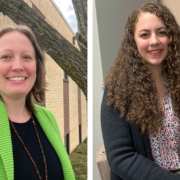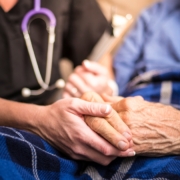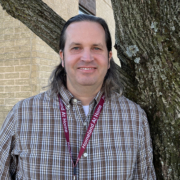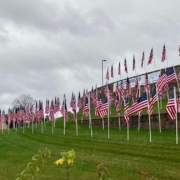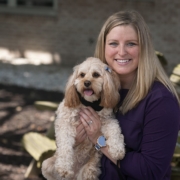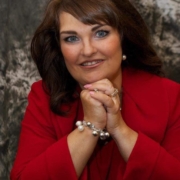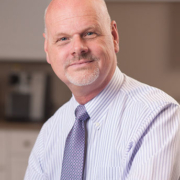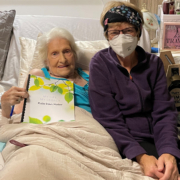Volunteers, a Key Part of Homeland Hospice
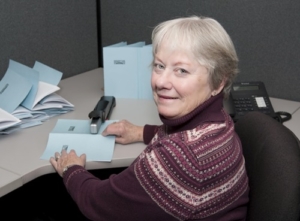 Hospice care in America was founded by volunteers and remains a core part of the strength, support, services and comfort that hospice continues to provide to patients and their loved ones. Indeed, Medicare regulations require that hospices have trained volunteers for the services they deliver to individuals and families.
Hospice care in America was founded by volunteers and remains a core part of the strength, support, services and comfort that hospice continues to provide to patients and their loved ones. Indeed, Medicare regulations require that hospices have trained volunteers for the services they deliver to individuals and families.
At Homeland Hospice, our trained, dedicated and caring volunteers help support individuals and their families in their homes. Assistance may include aid with light housework, preparing small meals, running errands or otherwise providing respite to family caregivers and comfort and companionship to patients.
Other Homeland Hospice volunteers provide key office administrative support, allowing our professional staff to spend more time focused on serving individuals and families rather than on paperwork.
They are trained to watch for signs and symptoms of life-limiting illnesses and help patients cope with loss, grief and bereavement – as well as the simple act of really listening.
Homeland Hospice just would not be the same without our dedicated, trained and committed volunteers.
We’d like you to meet a couple of them now to learn why they volunteer at Homeland Hospice and how this experience enriches their lives, as well as the lives of the individuals and families they serve.
Working behind the scenes so Homeland Hospice staff can remain on the front lines
Claudia Diane Brown has a knack for organization and she has a love of serving her fellow man. The Capital Blue Cross retiree combines these assets as an administrative volunteer in the Homeland Hospice office.
Claudia came to Homeland after hearing about its work from her substitute church pastor, the Rev. Anne Myers, who also happens to be Homeland Hospice’s spiritual counselor.
“She spoke to our Sunday school about hospice and the need for volunteers,” Claudia recounts. “I ended up getting three more people to come and volunteer with me. From the very beginning, from the very first day, all the Homeland Hospice people were so compassionate, so friendly and so willing to let you know you are appreciated.”
Claudia, who has volunteered for more than a year, assists with administrative work, mailings, filing, preparing patient notebooks and other paperwork. She compiles the blank patient booklets, adding all the necessary forms, pamphlets and papers so the intake folders are ready when the nursing staff needs them.
This year, Claudia plans to help with Homeland Hospice’s membership mailings, its donor outreach and fundraising.
“It is just a very nice atmosphere, and it makes you want to help out,” said the 67-year-old. “I joyously go every week. It is just so gratifying to be doing something and making a difference and being appreciated.”
There’s also a personal side to her dedication to hospice.
“My mother had hospice. She had it in her home,” Claudia says. “I just always felt I wanted to give back. Whatever I can do to lighten the load of those who serve the patients, so they have more time with the patients, is what I want to do. Whatever they need, I am happy to help them with.”
Being there for a family in need is its own reward
Keith Rockey often wonders how it is, that although he is the volunteer helping an individual and his loved ones, he feels like the one being rewarded.
This is the gift of being a Homeland Hospice volunteer. Keith ventures into the homes of patients to provide comfort, companionship, respite – pretty much anything the family might need.
The 73-year-old says he learns something profound about the gift we call life from every patient and family he helps.
“The families are so thankful for what I do,” Keith says. “But I get so much from them. I am so blessed to receive it.”
Keith usually volunteers a couple of days a week, spending at least three or four hours at a time with a patient. During that time he does light housework, runs errands and simply offers companionship.
After each visit, he finds his spirit is lifted a little higher.
“When I leave their home, I am more fulfilled than they can ever imagine,” Keith says. “I am filled with grace. I learn a lot from the patients and the families. I learned a lot about love. All I can say is it is so fulfilling to me. I receive more from them than they receive from me. It’s redemption, I guess you could say.”
The demand for hospice volunteers will only increase
The hospice movement will continue to grow to meet the increasing needs for this vital, dignified, life-affirming service on the strength and support of volunteers.
“Hospice will only grow,” predicts Keith, who has been volunteering for 13 years, two of them with Homeland Hospice.
“I think hospice will only get bigger and need more volunteers,” he adds. “The future for hospice in this country is unbounded. We are all going to face the end of life. And hospice is the way to do it.”
But far from being dominated by death, the hospice philosophy and the hospice volunteer spirit are about validating and enriching the life that is left.
“Don’t fear it,” Keith urges prospective hospice volunteers. “And don’t sell short that you can’t do it. We are fearful of things we don’t know much about. And we fear death, and we don’t want to be around people who are dying. I was the same way. But you don’t know, you really don’t know.”
Because life abounds in hospice.
Says Keith: “Of all the years I have volunteered, I have not heard one complaint or one person who was ‘down’ because they are dying. A lot of them reminisce about their life, and they are glad to do it in a happy way. It’s very graceful.”
Equally graceful are our dedicated Homeland Hospice volunteers who give so freely of their time and talents to strengthen and reaffirm the spirit of the hospice movement.
In the process, they lighten the load and brighten the spirit of individuals and their families who are facing life’s ultimate transition.

